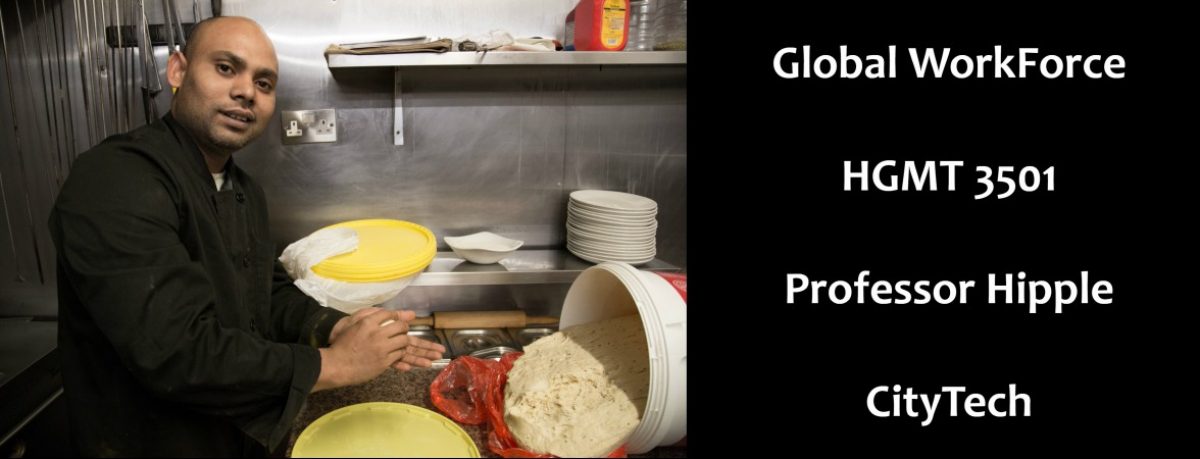Contents
- 1 Course Description
- 2 Course Objectives
- 3 Course Requirements
- 4 MISSION STATEMENT
- 5 NYC COLLEGE OF TECHNOLOGY STATEMENT ON ACADEMIC INTEGRITY
- 6 STATEMENT OF ACADEMIC DISHONESTY AND PLAGIARISM
- 7 STATEMENT OF CLASSROOM BEHAVIOR
- 8 PROFESSIONALISM AND PARTICIPATION
- 9 USE OF ELECTRONIC DEVICES
- 10 ORAL PRESENTATION STYLE STATEMENT:
- 11 WRITING STYLE STATEMENT
Course Description
Examine the role of management and leadership in hospitality and other service organizations.
Identify both challenges and opportunities facing organizations such as responding to globalization, managing workforce diversity, stimulation, innovation and change, improving quality and productivity and other issues relevant to the management of human resources in today’s dynamic hospitality business climate.
Course Objectives
a. Identify, evaluate and demonstrate the impact of teamwork within various organizational settings including the classroom-learning environment
b. Name and describe challenges and benefits of working within a diverse workforce
c. Evaluate and discuss the role of human resources management and its relationship to achieving corporate objectives
d. Examine and report the key attributes and challenges of organizational change
e. Define key language and understand primary concepts pertinent to effective management of a hospitality workforce in a global marketplace
Course Requirements
Class Participation:
Fourteen (14) Weekly Written Assignments Will be Posted on Blackboard. Ten are mandatory, though students may earn extra credit by turning in all 14. No late assignments will be accepted. Students must submit at least 10 weekly written assignments to receive full credit.
Oral presentation
Final or presentation
MISSION STATEMENT
The mission of the Department of Hospitality Management of New York City College of Technology is to provide students with a hospitality career education that integrates applied management practices and theory with liberal arts and sciences. To fulfill its mission, the department will:
- offer a comprehensive applied management curriculum;
- provide students with the necessary professional and communications skills for successful careers;
- foster an understanding of social responsibility through involvement in community service.
NYC COLLEGE OF TECHNOLOGY STATEMENT ON ACADEMIC INTEGRITY
Students and all others who work with information, ideas, texts, images, music, inventions, and other intellectual property owe their audience and sources accuracy and honesty in using, crediting, and citing sources. As a community of intellectual and professional workers, the College recognizes its responsibility for providing instruction in information literacy and academic integrity, offering models of good practice, and responding vigilantly and appropriately to infractions of academic integrity. Accordingly, academic dishonesty is prohibited in The City University of New York and at New York City College of Technology and is punishable by penalties, including failing grades, suspension, and expulsion. The complete text of the College Academic Integrity Policy Manual may be found on the College website.
STATEMENT OF ACADEMIC DISHONESTY AND PLAGIARISM
As stated in the Academic Integrity Policy Manual, “academic dishonesty occurs when individuals plagiarize or cheat in the course of their academic work. Plagiarism is the presenting of someone else’s ideas without proper credit or attribution. Cheating is the unauthorized use or attempted use of material, information, notes, study aids, devices or communication during an academic exercise.”
STATEMENT OF CLASSROOM BEHAVIOR
Each student has the right to study and learn in a comfortable, safe, supportive environment that promotes self-esteem – free of fear, humiliation, intimidation, offensive or suggestive language.
PROFESSIONALISM AND PARTICIPATION
The Department of Hospitality Management follows industry standards in order to educate, develop and mentor future hospitality and tourism professionals. In order to successfully complete a course, students must consistently participate in class and meet deadlines.
USE OF ELECTRONIC DEVICES
As stated in the Student Handbook, the use of cellular phones and audio equipment in all academic and study areas of the college is prohibited. Students are not permitted to take calls or text message during class. Students may not use their cell phones as calculators. In some instances, an instructor may allow the use of personal electronic devices for in class activities.
ORAL PRESENTATION STYLE STATEMENT:
The Hospitality Management Department has developed a standardized format for all oral presentations. Refer to the Oral Presentation Rubric.
WRITING STYLE STATEMENT
The hospitality management department has developed a standardized format for all written assignments. Written work must be prepared using APA Style Publication Manual of the American Psychological Association as a reference guide. All editorial formats, abbreviations, use of statistics, graphs, citations and references must conform to APA style. Footnotes are not permissible. Visit the City Tech Library website for APA Style Guides.



